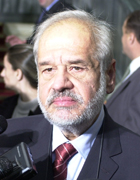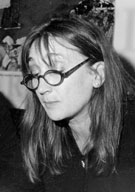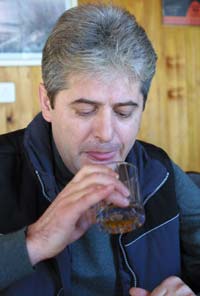|
Enter content here One Albanian-Gang Murder and Burning Of Three Non-Albanian Houses In Crisis Regions. A1 TV By Irina Gelevska, A1 TV Tetovo and Kumanovo - Last night in the Tetovo's village Nerashte Nazmi Chazimu killed Xheladin Murati. The villagers have apprehended the killer and handed him over to the police patrols today. The reason for the murder is misunderstanding among two rival criminal gangs. The police is conducting investigation about the case.
Unknown perpetrators burned the house of Chedomir Dimitrievich in Kumanovo's village Opae last night. The owner has just reconstructed it. Dimitrievich, a Serb refugee, was planning to return to the village with his family.
According to the statements by eyewitnesses, unidentified perpetrators burned two houses in the Kumanovo's village Ropaljce, also. Arsonists burned the house Stavre Bojkovich last night and set on fire the home of Milo Miletich early this morning.
The police is conducting an investigation, also. OSCE and NATO are informed about these last incidents in the crise regions. SITUATION IN CRISIS REGIONS. MIA No shootings can be heard on Sunday afternoon in Tetovo area, while occasional shootings and volleys of fire were registered during the morning.
According to police sources, the shootings came from Drenovec 2 district in Tetovo, as well as from Poroj, Neprosteno, Prsovce, Neraste, Odri, Dolno Orasje, and Ezero locality in the northern part of Polog valley.
The shootings were not targeted so the Macedonian security forces did not respond.
Around 18.30 Saturday night Murat Xheladini (1953) was killed in a shootout in Neraste village near Tetovo.
According to Tetovo police department, Xheladini has suffered from serious bullet injuries in the shootout with Nazmi Kazimi (1960) also from Neraste.
Kazimi has been taken into custody and criminal charges will be pressed against him.
Teams from the police department, the Elementary Court and the district attorney's office from Tetovo accompanied by the representatives of EU monitoring mission, OSCE and NATO's "Amber Fox" mission investigated the spot of the incident.
The spokesman of the governmental Coordinate Crisis Management Body, Zoran Tanevski confirmed the information.
He also informed that Ethnically mixed police teams entered Sunday in all villages near Skopje and Kumanovo, as determined by the major plan for redeployment of police units in the crisis regions.
In Gostivar municipality, police units entered only in the village of Belovste. The units did not enter in the villages of Ciflik and Larce near Tetovo, but Tanevski said that conditions for patrolling in those villages would be created very soon. The local population prevented entrance in Beloviste.
Less intensive violations of the public order and peace were registered during the night in Tetovo and Kumanovo regions of crisis, Tanevski said.
In Kumanovo village Opae around 21.00h Saturday night, the roof of Cedo Dimitrievski's house was burnt, while the house of Milo Mitrovic in Ropaljce village was burnt down around 21.50h. The causes for the fire are being investigated. MINISTER CASULE MEETS MACEDONIAN IMMIGRANTS IN CANADA. MIA 
Macedonian Foreign Minister Slobodan Casule is in two-day visit to Toronto, Canada upon the invitation of "United Macedonians" organization, in the honor of celebrating the birth of the great Macedonian revolutionist Goce Delcev.
During the visit, according to the Foreign Ministry, Minister Casule met with the representatives of the "United Macedonians," the church communities and other associations of the Macedonian diaspora in Canada.
Minister Casule had an address at Saturday's celebration held in the Macedonian Orthodox Church "St. Kliment Ohridski" in Toronto, where he spoke of the current developments in Macedonia as well as the efforts made by the Macedonian Government for resolving the crisis.
Minister Casule will also have meetings with distinguished representatives of the Macedonian community in Toronto. Latter on Sunday he will return to New York and will have several bilateral meetings with his counterparts. PRESIDENT TRAJKOVSKI'S MEETINGS IN NEW YORK. MIA Macedonian President Boris Trajkovski, who is attending the World Economic Forum in New York, had meetings Sunday with the Director-General of the UN Food and Agriculture Organization, Jacques Diouf, member of the Swiss Federal Council Joseph Deiss, Slovenian Prime Minister Janez Drnovsek and Head of the Jewish community Rabbi Arthir Schneier.
At the meeting with Diouf, also attended by Macedonian permanent representative to the United Nations Srgjan Kerim, Trajkovski pointed out the FAO role and its General Director in improving of the cooperation among the FAO member countries. Extending satisfaction with the good cooperation between Macedonia and FAO, Trajkovski urged for its intensifying, considering the importance of agricultural production in the country.
Mr. Diouf said he would keep supporting the further cooperation between FAO and Macedonia, which would be intensified by new projects. He invited Trajkovski to attend the World Food Summit, scheduled for June this year.
Extending his gratitude for the invitation, Trajkovski reiterated the need for FAO's assistance to Macedonia, particularly now, when the agriculture in Macedonia is still suffering from the losses due to last year conflict in the country.
At the meeting with Deiss, Trajkovski referred to the current developments in Macedonia, the efforts for overall stabilization of the country, full implementing of the Framework Agreement, the ongoing economic reforms, realizing of the Stabilization and association Agreement between Macedonia and the European Union, and developing perspectives of the country in the next period.
He also extended gratitude to the Swiss support and aid to Macedonia.
Switzerland would continue to grant support to Macedonia, Deiss said, pointing out the importance of the cooperation, carried out by the Swiss Organization for Facilitation of Investing (SOFI). The cooperation should be also intensified by new projects, he added.
The officials also discussed on multilateral cooperation, particularly within the Organization for Security and Co-operation in Europe (OSCE).
Trajkovski's meeting with Drnovsek was also attended by the Macedonian and Slovenian Finance Ministers and permanent representatives of both countries to the United Nations.
At the meeting, Trajkovski expressed satisfaction with good overall relations between the two countries, pledging for establishing of stable economic cooperation and reduction of the Macedonia's deficit in the trade exchange with Slovenia.
Drnovsek said Slovenia stood for intensifying of the overall cooperation, despite the good political and economic relations.
Both officials expressed satisfaction of the cooperation within the Institute for Public Finances, and between the Macedonian and Slovenian stock markets.
Slovenia would also support Macedonia's membership into the Cental European Free Trade Zone, the Macedonian Ministry of Foreign Affairs said in a press release.
Today, Trajkovski also met with Head of the Jewish community Rabbi Arthur Schneier.
The meeting was focused on Trajkovski's initiative for holding of a Regional Forum on dialogue of civilizations. Schneier, as President of the Appeal of Conscience Foundation, said it would participate in preparing of this forum.
On Saturday, Trajkovski, accompanied by Finance Minister Nikola Gruevski, received a delegation of the Washington EX-IM Bank, led by Vice Chairman and First Vice President Eduardo Aguirre.
Trajkovski briefed the bank delegation about the current political and economic developments in Macedonia, particularly on the ongoing economic reforms and the country's cooperation with the European Union, the Foreign Ministry said in a press release.
Mr. Aguirre said the bank was interested in to intensify its presence in the Balkan region. He welcomed the improved situation in regard with the stability of Macedonia, saying that the bank would keep encouraging US businessmen to raise the export rate on the markets in the region.
Gruevski briefed the delegation about the macro-economic policy of Macedonia, its cooperation with the International Monetary Fund and the World Bank, and ongoing reforms of the banking system.
Trajkovski once again referred to the unexploited possibilities for cooperation, expressing believe that businessmen and companies from both private and public sector of Macedonia would be interested in cooperating with this eminent bank. Dinesen: "Ahmeti Is A Terrorist" Reality Macedonia 
Anne Marie Dinesen, PhD. assistant professor, Aarhus University, Danmark. Updated. Originally published on January 18, 2002, in the "Debat" section of the Danish newspaper Weekendavisen. The editor thanks B.G. for the help in facilitating the communication. Macedonia. Timothy Garton Ash does not take into account that the Albanian minority had their rights secured ten years ago. The terror of NLA helps nobody. AHMETI IS A TERRORIST. By Anne Marie Dinesen, PhD.
assistant professor, Aarhus University, Danmark. The 30th of November [2001] Weekendavisen published an article on Macedonia with the title: "The good terrorist", written by Timothy Garton Ash and originally published in New York Review of Books. The headline refers to Ali Ahmeti, the Albanian-Macedonian leader of NLA (National Liberty Army), the former UCK which operated in Kosovo. Ahmeti and NLA started their activities in Macedonia in the beginning of 2001, activities which by some international observers are described as "terrorism" by others as "resistance movements". Garton Ash himself cannot decide whether to accept one or the other description, and since he does not know what to think, he visits Ali Ahmeti in order to ask him if he is a terrorist? Ahmeti of course replies that he fights for liberty. However it should first of all make Garton Ash wonder at what the Kosovoalbanian Liberty Army does in Macedonia? And next he should wonder at the fact that there have been no problems whatsoever in Macedonia since the country obtained independence in 1991. If the Macedonian authorities systematically had oppressed the Albanian minority the last ten years, wouldn’t the minority have drawn attention to the problems earlier? Garton Ash writes that "the international help to the weak Macedonian economy is being held back until such changes of the constitution which finally secure the equality of the Albanians are made." The extremely curious thing is that the Macedonian constitution which became established in 1991, also became accepted by the European Union and evaluated – specifically what concerns human rights and ethnic rights –by the international EU expert commission lead by the French expert in constitutions Robert Badinter. And that the acceptance of the constitution was a precondition for Macedonia’s signing the EU stability pact. The constitution guarantees a number of rights for the Albanian minority which amounts to approximately 23 % of the 2 million inhabitants. Most of these rights are already realized. And this autumn an University providing education in Albanian language, financially supported by EU has opened. [Its establishment was agreed almost a year before the war started.] In the Macedonian government six out of eighteen ministers are Albanian, that is 33 %, two out of four vice presidents are Albanian, that is, 50%. The two groups of inhabitants have lived side by side the last ten years without major problems. So what has happened since 1991 which makes that "the international society" no longer agrees with itself concerning the constitution and the respect of the rights for the minority? And as a consequence withhold the extremely necessary financial support? 
Ali Ahmeti. The war between Serbia and Kosovo in the early spring of 1999 is the changing factor. When the troops that should maintain peace were withdrawn from Kosovo, and NATO started bombing Serbia, the civil population fled through the mountains to the northwest of Macedonia. Macedonia received approximately 400,000 Kosovoalbanian refugees. Would the country do that if there were a generalized hatred towards the Muslim Albanians? It is not sure how many of the Kosovoalbanian refugees that are still in Macedonia, but in the name of this – new - minority, NLA and similar groups perform acts of terror against both the Macedonian civil population which has become almost totally expelled from the northwestern region, against Macedonian soldiers and against Christian Orthodox cultural monuments which they bomb. In the spring a group of Macedonian soldiers was surrounded, scalped, their genitals were cut off and placed in the mouths of the victims while the act became filmed by the aggressors. The original Albanian minority has got no interest in these acts. The constitution which secures their rights already exists, and the [issue of] Kosovoalbanian refugees is another thing. Most of these are poor peasant from the mountains, who probably have more need for financial support to become re-established in Kosovo than they need a university in Macedonia. NLA and the like violate the peace in name of the refugees, but what is it that they themselves want to obtain? Some say that they want to establish a unified big Muslim Albanian country, others that they want to maintain control of the region in the mountains in the northwest of Macedonia, in which region they perform their profitable "business" like smuggling drugs, weapons, tobacco, women, with a view to become able to realize the former. But nobody can doubt upon the fact that it is acts of terrorism, and it is interesting that George W. Bush for once keeps up with the situation and condemns the terrorism. Additional comments, sent by the author via e-mail: Concerning the claims of NLA etc.: I had to abbreviate my paper for the newspaper which means that one of the arguments did not appear. But the mentioned American journalist writes that the Macedonian authorities say that there are 23 % Albanians in Macedonia, while the correct percentage is 33%, that is, he says, the Macedonian authorities manipulate the numbers. But according to all official sources the percentage was 23 at least until 1999 - so if the correct percentage now is 33% - which means 200,000 more - then one can conclude that out of the approximately 400,000 refugees from Kosovo, only 200,000 went back to Kosovo after the war -so that the 10 % simply are the refugees. The international society did next to nothing for the refugees from Kosovo when NATO started to bomb Serbia, UN had not enough money to establish camps in Macedonia partly because US does not pay their huge debt to UN, which did not sanction the war. US does not want UN to play a more important role in global politics than they themselves together with NATO do - and the consequence is that Macedonia alone has to take responsibility for all the refugees in the name of which the terrorists commit acts which I at least will not call "fighting for ethnic rights". I do understand that the situation for the refugees is not very happy - but I do not see why the international society can permit itself to leave all the problems to Macedonia - it was not Macedonia which declared war to Serbia, it was NATO and their allied in Kosovo. I know that NLA claims this and that but sometimes it is more important to look at the acts of persons and not listen so much to their discursive constructions about themselves. It is as a matter of fact kind of miracle that I had the short text published at all in a newspaper in this country which for every day becomes more and more related to "big brother" with the infinite resources within war industry and the tendency to solve all problems in the world with bombs. Even the intellectuals in this country accept such conduct - of course because it is difficult to analyze what happens, the globalization makes the world more complex, and more difficult to identify the bad and the good guys. The problem is that such does not exist - I think it is more fruitful to make a prior distinction between civilians and non-civilians, the civilians are always the victims no matter which country. FINANCE MINISTER-NEW YORK-WORLD ECONOMIC FORUM. BTA Finance Minister Talks with Representatives of EasyGroup, JP Morgan Chase, AOL Time Warner, Oracle, Microsoft.
Sofia, February 3 (BTA) - Finance Minister Milen Velchev, who is in New York for the World Economic Forum, talked with representatives of JP Morgan Chase, AOL Time Warner, Oracle and Microsoft, <www.econ.bg> reported. Velchev's main aim was to provide information on the economic situation in Bulgaria and its successes.
Velchev talked with Stelios Haji-Ioannou, Founder and Chairman of London's EasyGroup.
Business circles abroad have come to see investment opportunities in Bulgaria as more attractive than they used to be, according to Velchev. |



